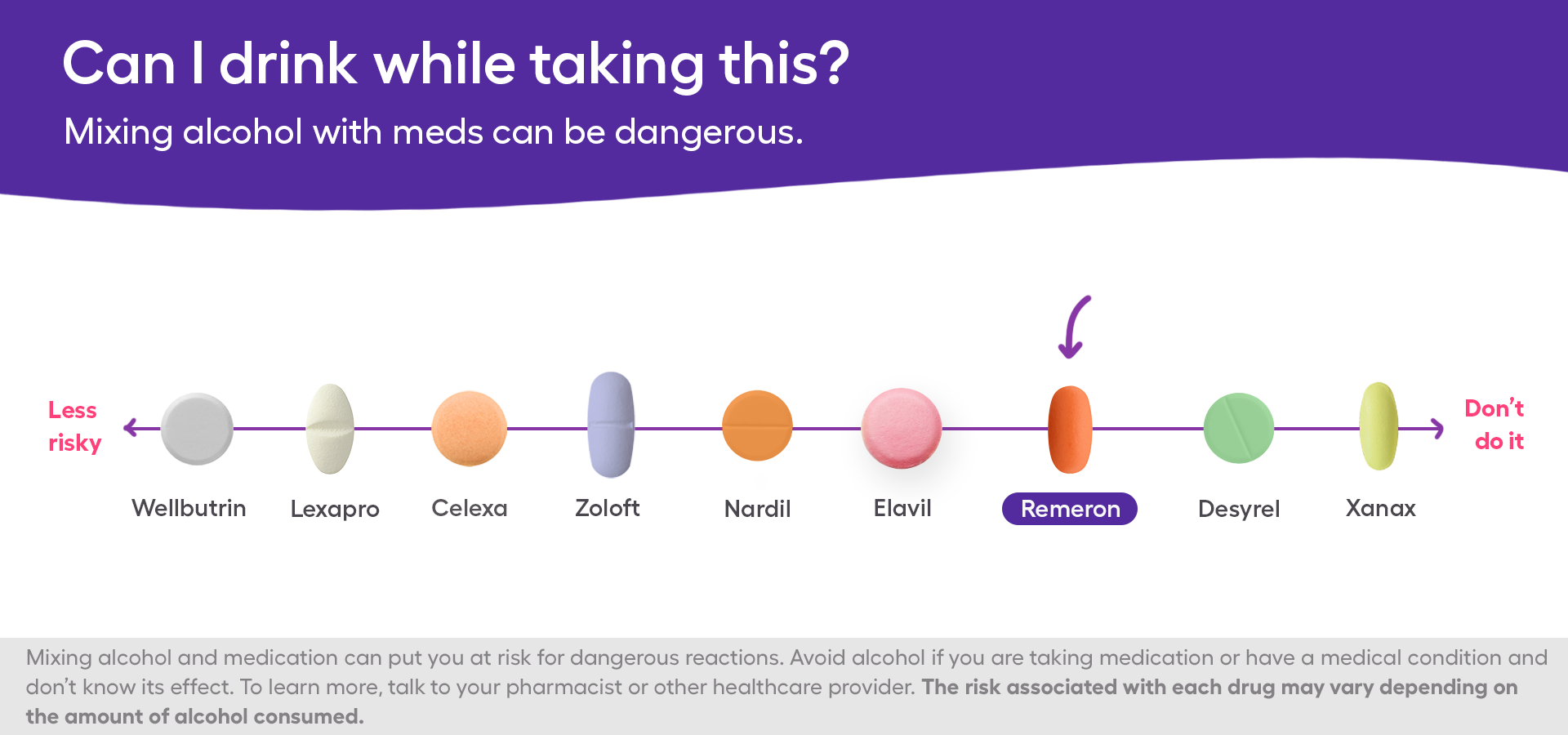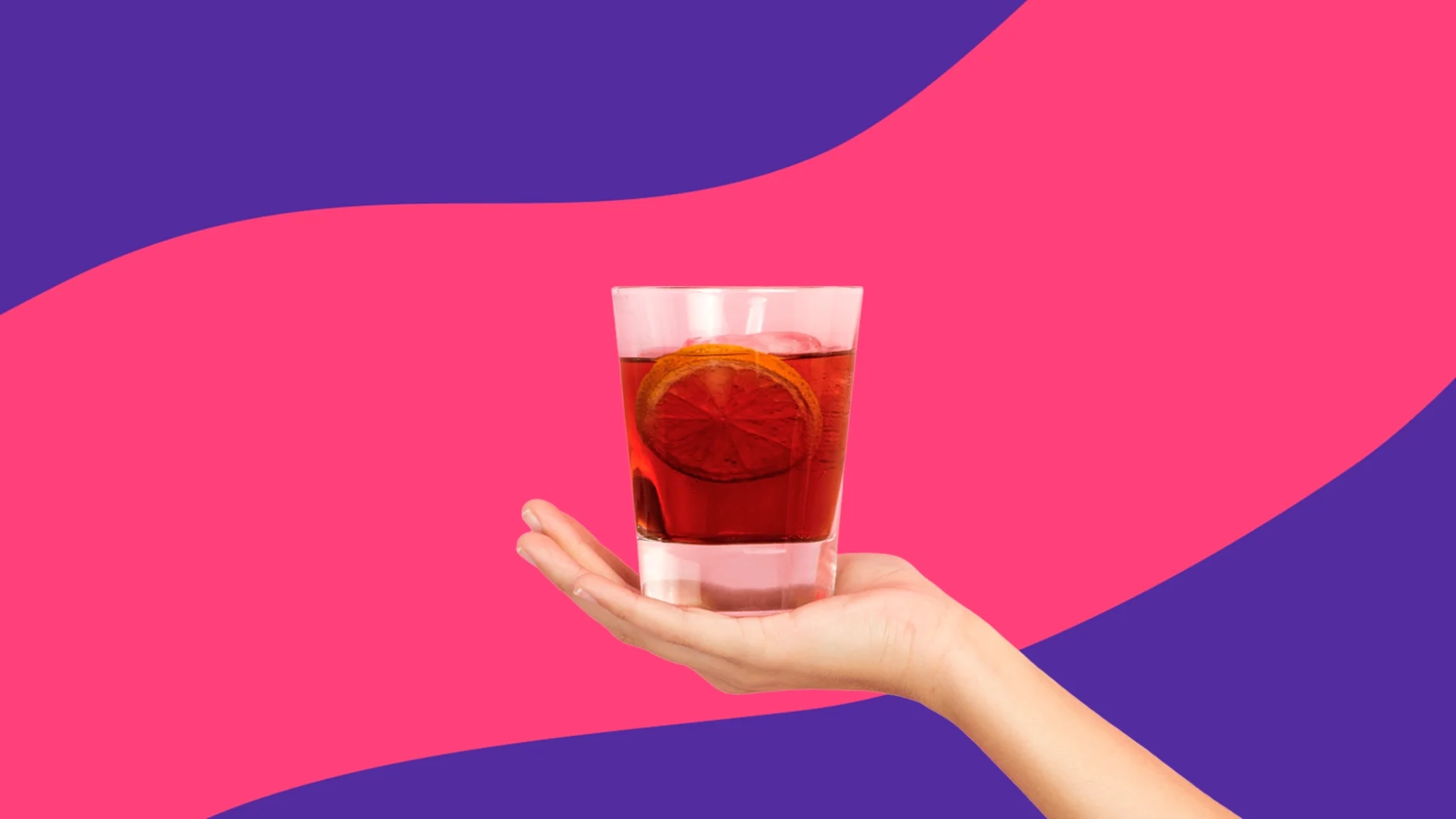Key takeaways
Common side effects of mixing mirtazapine and alcohol include increased drowsiness and dizziness.
Serious risks include liver damage, heart rhythm problems, and an increased risk of infections over time.
Drinking alcohol while on mirtazapine is generally not recommended but may be possible in moderation with a healthcare provider’s approval.
Always consult a provider before drinking on mirtazapine, as reactions vary from person to person.
Mirtazapine is a prescription medication approved to treat depression, and is particularly helpful for improving sleep and overall mood. Though this medication can be effective, some who take it might find themselves at a dinner party, a night out with friends, or another situation that involves alcohol. However, mixing mirtazapine and alcohol is not recommended due to potential health risks and increased side effects, like drowsiness and dizziness.
For those who have been on mirtazapine for a while and understand how it affects them, drinking in moderation might be possible with a doctor’s okay. It’s important to talk to a healthcare provider before combining these substances, as everyone reacts differently.
How does mirtazapine work?
Mirtazapine, also known by the brand name Remeron, is an antidepressant medication. It is used to treat symptoms of major depressive disorder, such as a low mood, problems with sleep, and feelings of hopelessness.
Mirtazapine belongs to a specific class of antidepressants called atypical tetracyclic antidepressants (not to be confused with tricyclic antidepressants). It works by changing the levels of certain chemicals in the brain called neurotransmitters. Mirtazapine mainly affects serotonin and norepinephrine, which are believed to be key in managing mood and emotions.
Doctors and healthcare providers typically prescribe mirtazapine as an oral tablet. The usual dosage is 15 to 45 mg once daily at bedtime to reduce drowsiness during the day.
Can you drink while taking mirtazapine?
The drug’s Food and Drug Administration (FDA) label recommends avoiding alcohol while taking mirtazapine. The medication can have sedative effects, and combining it with alcohol can increase the risk of these effects, like drowsiness and impaired coordination.
Side effects are most likely to occur during the first few days to a week of treatment. Therefore, it’s especially important to avoid alcohol when starting treatment to see how the medication affects the body. On the other hand, people who have taken mirtazapine for some time may be used to the drug’s effects. After discussing it with a healthcare provider, it may be possible to consume alcohol in moderation.
Drinking in moderation typically means limiting alcohol to up to two drinks per day for men and no more than one drink per day for women. A standard drink contains approximately 14 grams of pure alcohol, equivalent to a 12-ounce beer, a 5-ounce glass of wine, or 1.5 ounces of distilled spirits.

What happens if you mix mirtazapine and alcohol?
Combining mirtazapine with alcohol affects the body in several ways. Although alcohol won’t affect the levels of mirtazapine in the body, combining the two may come with additive effects, such as increased drowsiness, liver issues, and heart rhythm problems.
Drowsiness
When taken together, mirtazapine and alcohol can cause severe drowsiness. Both mirtazapine and alcohol can act as central nervous system (CNS) depressants, which means they can slow activity in the brain. Combining the two can affect a person’s ability to stay awake and responsive, which may lead to dangerous situations, especially while driving or operating machinery.
Dizziness
Mixing alcohol with mirtazapine often leads to increased dizziness. Some people who take mirtazapine may experience low blood pressure when getting up from a sitting or lying position (orthostatic hypotension). In addition, it’s not uncommon to experience feelings of lightheadedness after taking mirtazapine, which may be amplified with alcohol. Mixing mirtazapine and alcohol may lead to balance issues and increase the risk of falls or accidents.
Weight gain
One of the side effects of mirtazapine is unintended weight gain. Many alcoholic drinks can be calorie-dense and even stimulate appetite, compounding this effect further. Therefore, mixing mirtazapine with alcohol could potentially lead to increased weight gain, making it harder for many to maintain a healthy weight.
Liver problems
Mirtazapine is metabolized, or processed, by the liver, with some people reporting changes in liver function tests or even liver injuries after taking it. The liver also processes alcohol, which is known to cause liver disease when consumed in large amounts over time. When taken together, mirtazapine and alcohol can place too much stress on this organ, which could lead to serious health conditions affecting the liver.
Low white blood cell count
In rare cases, mirtazapine can lead to lower counts of white blood cells, the body’s defenders that help fight infections. With fewer white blood cells, you might get sick more easily. Frequent and heavy use of alcohol can also reduce white blood cell counts, worsening the risk of infections. Signs of a low white blood cell count include frequent colds or other infections.
Heart rhythm problems
Combining alcohol and mirtazapine may cause heart rhythm problems. Both substances can affect how the heart beats, leading to arrhythmias or other cardiac conditions. Some people, particularly those with pre-existing heart conditions, may be more sensitive to heart rhythm changes.
The effects of mixing mirtazapine and alcohol can be different for each person. Factors like how much medicine or alcohol is taken, a person’s health, and their tolerance can all play a role in how serious the effects might be.
Are certain people at greater risk of side effects?
Certain groups are more likely to experience intensified side effects when mixing mirtazapine with alcohol. Age and pre-existing conditions such as kidney or liver problems can also increase the risk of side effects.
Older adults
Older adults often have a slower metabolism, which means drugs like mirtazapine and alcohol stay in their bodies longer. As a result, they might experience an increased risk of side effects like dizziness and drowsiness. These side effects can be more pronounced and dangerous, increasing the risk of falls and injuries. Lower tolerances to alcohol among older adults can also worsen the risks of mixing mirtazapine and alcohol, even in small amounts.
People with kidney problems
People with kidney problems may struggle to clear drugs from their bodies properly. The levels of mirtazapine might build up, leading to increased side effects. Alcohol can also disrupt how well the kidneys work. Therefore, combining alcohol with mirtazapine can strain the kidneys.
People with liver problems
The liver helps process both alcohol and medications like mirtazapine. Like those with kidney problems, people with liver problems may experience higher levels of mirtazapine in their system. Liver impairment also makes it harder to clear alcohol from the body, which can lead to increased effects of both substances.
People who fall into these categories may need to be particularly cautious before drinking alcohol while taking mirtazapine. In many cases, a healthcare provider will adjust the mirtazapine dosage in these individuals.
How long after taking mirtazapine can you drink alcohol?
Mirtazapine has a half-life of around 20 to 40 hours. The half-life of a drug is the time it takes for half the amount of the drug to be eliminated from the body. This means that after about 20 to 40 hours, half of the mirtazapine dose is still in the body.
It typically takes about five half-lives for a drug to be mostly cleared from the body. For mirtazapine, this process could take up to 200 hours, or roughly eight days, to reach levels of clearance. Drinking alcohol when mirtazapine is still in your system can still lead to side effects, even after you’ve taken your last dose.
To be on the safe side, you may want to wait at least eight days after the last mirtazapine dose before drinking alcohol to lower potential risks. Consult a healthcare provider for medical advice when deciding whether alcohol consumption is safe after stopping mirtazapine.
Other considerations while taking mirtazapine
Mirtazapine may cause other side effects that aren’t affected by alcohol. Some individuals may experience side effects that require immediate attention. Other serious side effects of mirtazapine that haven’t been mentioned yet include:
- Seizures
- Manic episodes
- Severe skin reactions
- Eye problems
- Serotonin syndrome
Withdrawal symptoms may occur if mirtazapine is stopped suddenly. Therefore, the dosage is usually decreased slowly over time to prevent symptoms like agitation, anxiety, confusion, and headaches.
Mirtazapine can also come with drug interactions. Discuss other medications you take with a healthcare provider before starting mirtazapine, especially if you take benzodiazepines, muscle relaxants, or sleep aids, among other CNS depressants.
Are all antidepressants affected by alcohol?
Many antidepressant medications can be affected by drinking alcohol. How they interact can vary based on the type of medication, how much alcohol is consumed, and individual differences in how people’s bodies react to either the drug or alcohol. Antidepressants to use with caution may include:
- Selective serotonin reuptake inhibitors (SSRIs) such as Prozac (fluoxetine), Zoloft (sertraline), and Celexa (citalopram)
- Serotonin-norepinephrine reuptake inhibitors (SNRIs) such as Cymbalta (duloxetine), Effexor XR (venlafaxine), and Pristiq (desvenlafaxine)
- Tricyclic antidepressants such as Elavil (amitriptyline), Tofranil (imipramine), and Pamelor (nortriptyline)
- Monoamine oxidase inhibitors (MAOIs) such as Nardil (phenelzine), Parnate (tranylcypromine), and Marplan (isocarboxazid)
- Other atypical antidepressants such as Wellbutrin (bupropion), Remeron (mirtazapine), and Desyrel (trazodone)
Different types of antidepressants can react in various ways when you drink alcohol. Consider your overall health and consult a healthcare provider for the best treatment options for depression.
Alcohol and its effects on mental health
Alcohol might temporarily improve mood, but in the long term, it can lead to increased feelings of depression and anxiety. For people with conditions like depression or anxiety, alcohol may worsen these symptoms over time.
Regular use can also lead to alcohol dependence, in which a person feels a need to drink to function normally. Dependence can create a cycle of increased mental health problems, including panic attacks or increased anxiety. Chronic and heavy alcohol abuse may also increase the risk of substance abuse, which may require addiction treatment or detox programs.
If you or someone you know is struggling with alcohol use, seek professional help. Support from healthcare providers, counselors, or support groups can make a difference in recovery and improvements in mental health.
The bottom line
Mixing mirtazapine and alcohol is not a good idea because it can cause increased drowsiness and dizziness while also causing other problems. Both can put extra strain on your liver or kidneys and may affect your heart’s rhythm. Regularly drinking while on mirtazapine can also lead to weight gain and reduce your ability to fight infections. While some people might be able to drink in moderation after talking to their healthcare provider, it’s important to use caution and watch for any severe reactions.
- Remeron highlights of prescribing information, U.S. Food and Drug Administration (2021)
- What is a standard drink?, National Institute on Alcohol Abuse and Alcoholism (2024)
- Antidepressant drugs effects on blood pressure, Frontiers in Cardiovascular Medicine (2021)
- The effect of alcohol on food-related attentional bias, food reward and intake: Two experimental studies, Appetite (2021)
- Mirtazapine, LiverTox (2020)
- The hematological complications of alcoholism, Alcohol Health and Research World (1997)
- Ethanol potentiates mirtazapine-induced cardiotoxicity by inducing dysfunctional autophagy via HMGB1-dependent Akt/mTOR signaling pathway, Toxicology Letters (2022)
- Drinking alcohol affects your kidneys, National Kidney Foundation (2014)
- Clinical pharmacokinetics of mirtazapine, Clinical Pharmacokinetics (2000)
- Mirtazapine (Remeron), National Alliance on Mental Illness (2024)
- Alcohol, depression, and anxiety, Handbook of the Behavior and Psychology of Disease (2024)
- Family, individual, and other risk factors contributing to the risk of substance abuse in young adults: A narrative review, Cureus (2022)



